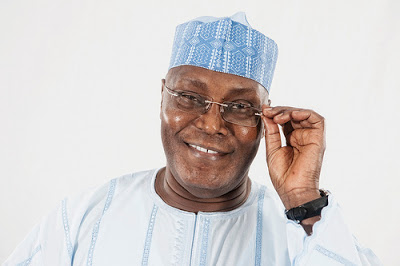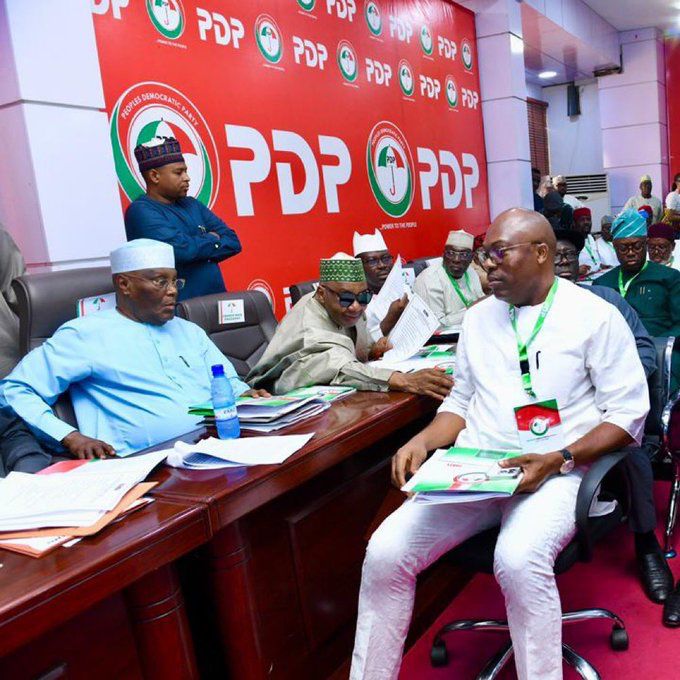Below is a brief autobiography of the Peoples Democratic party presidential candidate for the 2019 election, Alhaji Atiku Abubakar, as at 2014.
Childhood:
I was born on the 25th of November 1946 in Jada village, Adamawa State Like many of my generation, my father was opposed
to Western education and tried to keep me out of school. When the government discovered this, my father spent a few days in jail. I was then enrolled in
Jada primary school.
When I was only 11 years old, my father drowned and died while trying to cross a small river. The task of raising me then fell on my mother. At that age I resolved to work hard, remain focused and be
successful in life to make my her proud.
In 1960, I was admitted to Adamawa Provincial Secondary School in Yola.
Academically, I did well in English Language and Literature but I struggled with Physics, Chemistry and Mathematics. I spent most holidays working to earn extra money. In 1961, when I was 15 years old, my mother’s elder brother sold the family house in Jada without her knowledge and rendered us homeless. I spent that holiday working and from my earnings, I bought a house for my mother in Ganye.
I became an orphan when my mother suffered a heart attack and died in 1984.
Post Secondary School:
I graduated from secondary school in 1965. After that, I studied at the Nigeria Police College in Kaduna for a short while. I left when I was unable to present an O-Level Mathematics result. I worked briefly as a Tax Officer in the regional Ministry of Finance, from where I gained admission to the School of Hygiene in Kano in 1966.
I graduated with a Diploma in 1967, having served as Interim Student Union President at the School. In 1967 I enrolled for a Law Diploma at the Ahmadu Bello University Institute of Administration, on a scholarship from regional government. After graduation in 1969, I was employed by the Nigerian
Customs Service.
Family:
I met nineteen year old Titilayo Albert when I was serving at Idiroko, Lagos, and in December 1971 I married her secretly, because her family was initially opposed to the union. On 26 October 1972, Titi
delivered a baby girl and we named her Fatima. Titi later gave birth to Adamu, Halima and Aminu.
In January 1979 I married Ladi Yakubu as my second wife. I wanted to expand the Abubakar family. I had no siblings and I felt extremely lonely as a child. I did
not want my children to feel that way.
This is why I married more than one wife. My wives are my sisters, my friends, and my advisers and they complement one another. Ladi gave birth to Abba, Atiku, Zainab, Ummi-Hauwa, Maryam and Rukayatu.
In 1983 the late Lamido of Adamawa who had become like my father made me the Turaki of Adamawa. This position was usually reserved for one of the Emir’s favorite sons and was rarely given to non-royals like me. To ensure that I met the ‘blood tie’ requirement for the title, the Lamido gave me one of his daughters, Princess Rukaiyat, to marry.
She gave birth to Aisha, Hadiza, Aliyu, Asmau, Mustafa, Laila and Abdulsalam.
I married Fatima Shettima in 1986. She gave birth to Amina (Meena), Mohammed and two sets of twins Ahmed and Shehu, Zainab and Aisha and then Hafsat.
Jennifer Jamila Atiku-Abubakar is my last wife. She gave birth to Abdulmalik, Zara and my youngest child, Faisal.
Customs:
My Customs career commenced on 30 June 1969. My first posting was at Idi-Iroko, a border town between Nigeria and Benin Republic. My other assignments
included the Lagos Airport, Apapa Ports (1974), Ibadan Customs Command (1975), Kano Command (1976), Maiduguri (Area Comptroller, 1977), Kaduna (1980) and the Apapa Ports in 1982.
In April 1984, when I was the Murtala Muhammed Airport Area Administrator, my name was associated with a scandal that made headlines. As part of efforts
to cripple corrupt politicians who had stashes of stolen cash in their possession, the new military government had phased out the old naira currency and replaced it with new ones. Orders had been given to ensure that all luggage entering the country was properly screened to prevent smuggling of the old notes. The Emir of Gwangu and Ambassador
Dahiru Waziri had arrived from Saudi Arabia with many suitcases. As is customary, the suitcases were supposed to pass through Custom officers for check
but the Emir’s son, who was a Major in the Army and also ADC to Head of State Gen Buhari drove straight to the Tarmac with soldiers, off-loaded the suitcases
there, picked up his father and the Ambassador and drove away. The soldiers had threatened to shoot the Custom officers who had protested and tried to stop them. My officers reported in writing to me and I in turn reported the incidence to my boss, the Director of Customs. A few days later, one of the officers leaked the story to Guardian Newspapers and their correspondent called me to confirm if it was true. I did.
Soon after, Newspaper Headlines read,
“Passenger with 53 suitcases leaves airport unchecked”. This scandal embarrassed the government and they tried to make me deny it happened. I refused and they threatened to throw me
out of service. The Minister of Finance then, Soleye, who oversaw the Customs Service played a big role in ensuring I wasn’t dismissed. He had said it would
be unfair to punish me for being honest and standing by my officers.
In 1987 I was promoted to Deputy Director of Customs and Excise in charge of Enforcement and Drugs. In April 1989, when I was 43, I voluntarily retired from Customs after 20 years of meritorious
service.
Business:
I’ve always had a good nose for business. In my early years as a Customs officer, I received a 31,000 naira Housing Loan, built a bungalow in Yola, and rented it
out. With the rent I collected in advance, I bought a second plot and built another house. I continued building new houses with rent from completed ones and after a few years I had built 8 houses in choice
areas in Yola. When I was transferred to Kaduna, I continued this process and in a few years I had 5 houses there.
In 1981, I moved into agriculture. I became the largest maize farmer in the whole Gongola state..
Unfortunately, due to Government policies that increased the cost of production, the business fell on hard times and closed in 1986.
The most successful business I ever ventured into was with Gabrielle Volpi, an Italian businessman. He intimated me about how profitable Oil and Gas Logistics business could be and, trusting his abilities, I partnered with him to form NICOTES which started operating from a container office at Apapa ports.
When the business began to grow, we relocated to Onne, Rivers State. The company, now known as INTELS (Integrated and Logistics Services) is a multi-billion naira company that has a staff of over 15,000 people and pays huge dividends to its shareholders.
My other businesses include agriculture, feed making, plastics, printing, TV/radio media, and beverages.
Politics:
I met Shehu Musa Yar’Adua towards the end of my Customs career. He invited me to the political meetings that were happening regularly in his Lagos home; and that was how my foray into politics began.
In 1989 the political meetings became Peoples Front of Nigeria and I was elected as the National Vice- Chairman.
First Governorship Run (1990):
I won the Adamawa state SDP gubernatorial primaries in November 1991, but the FG later disqualified me from contesting the election.
First Presidential Run (1992):
When Shehu Yar’Adua was disqualified from contesting the 1992 presidential primary of the SDP, he pushed me forward as the focal point of SDP’s
ambitions. I came third in the convention primary. But because MKO Abiola, the winner, had won by only about 400 votes a run-off was due. I stepped down for Abiola, asking my supporters to cast their
votes for him, with an unwritten agreement that Abiola would announce me as his running mate. He eventually won the SDP ticket, but announced
Babagana Kingigbe as his running mate.
Second Governorship Run (1998):
I won the Adamawa State governorship elections in December 1998, but before I could be sworn in I was chosen by Olusegun Obasanjo, as his vice-presidential candidate. We won the 27 February 1999 Presidential Elections with 62.78 percent of the votes.
Vice Presidency (1999–2007):
I was sworn in as Vice-President of Nigeria on 29 May 1999. Coming in after decades of military rule, Nigeria was in a very bad shape all round. Priorities were decided. We started by stabilizing the polity. I was put in charge of the economy in the first tenure. I oversaw the sale of hundreds of loss-making and poorly managed public enterprises. We curbed
inflation, fixed our foreign debts and consolidated the banks. I supervised the telecoms reforms which brought us GSM. In my second tenure, due to issues like fighting the bid to amend the constitution that would allow the President run a third term, so many things went wrong. At a point, all my staffs were even withdrawn. But I have put all that behind me.
Second Presidential Run (2006–2007):
On 20 December 2006, I was chosen as the presidential candidate of the Action Congress. On 14 March 2007, INEC released the final list of 24 aspirants for the 21 April presidential election and
my name was missing from the ballot. INEC issued a statement stating that my name wasn’t there because I was on a list of persons indicted for corruption by a panel set up by the government. I headed to the courts on 16 March to have the disqualification overturned and on the 16th of April, the Supreme Court unanimously ruled that INEC had no power to disqualify candidates. This was barely 5 days to the election, when most people had given up hope that I would be allowed to contest. In the end, as announced by INEC, I came third, behind Umaru. Yar’Adua and Muhammadu Buhari.
Third Presidential Run (2011):
On the 22nd of November 2010, a Committee of Northern Elders selected me as the Northern Consensus Candidate, over former Military President
Ibrahim Babangida, former National Security Adviser Aliyu Gusau and Governor Bukola Saraki of Kwara
State. In January 2011, I contested for the Presidential ticket of the PDP alongside President Jonathan and Sarah Jubril. I came second.
All Progressives Congress:
On 2 February 2014, I joined the All Progressives Congress, and on this platform, I hope to run for Presidency of the Federal Republic of Nigeria.
-AA

 News6 years ago
News6 years ago
 Featured6 years ago
Featured6 years ago
 Boss Picks6 years ago
Boss Picks6 years ago
 Headline6 years ago
Headline6 years ago
 Headline6 years ago
Headline6 years ago
 Headline5 years ago
Headline5 years ago
 Headline6 years ago
Headline6 years ago
 Headline6 years ago
Headline6 years ago













